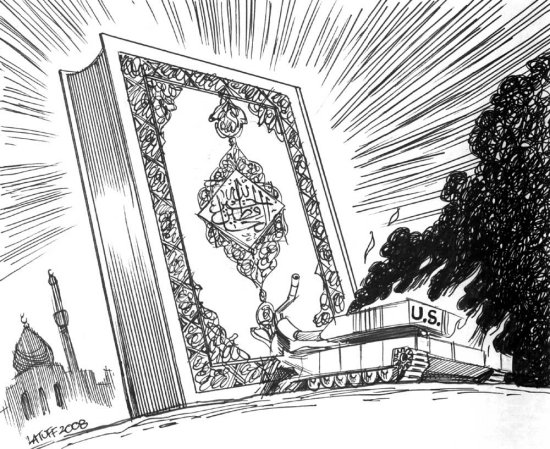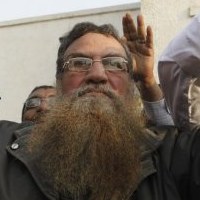First published: january 16, 2010; The Resistance Strategy.
by Barry Rubin
The Resistance Strategy: the Middle East’s Response to Calls for Peace and Moderation
Have you heard from any of the Western mass media about the Resistance strategy of Middle East radicals? I’m sure you haven’t. Yet without understanding this powerful and widely accepted worldview how could anyone possibly comprehend events in the region?
“Resistance” is the slogan used by Syria, Hamas, and Hizballah especially but also is used by Iran’s regime, other Lebanese supporters of the Iran-Syria bloc, and assorted radicals throughout the region. While the word has echoes for any Western auditor of the French Resistance against the Nazis, this is not the origin of this Middle East usage.
Rather, it means on the one hand, Resistance to supposed U.S., European, and Israeli intentions to turn the Arabs into slaves and destroy Islam. It also signifies Resistance to Westernization and modernization. And then, too, of equal significance, it means Resistance to attempts to promote peace or even a peace process with Israel and moderation in general.
Most obviously, Resistance means rejection but it also implies the use of violence, to resist is to reject diplomatic solutions and to fight instead. No matter how many people die, how much destruction will hurt the societies of those resisting, how long bloody conflict will continue, and how remote the prospects for victory seem to be, this is the preferred option. In contrast, moderation, compromise, and negotiation are seen as cowardly and treasonous.
But those preaching Resistance also believe they will be victorious by dividing and wearing down their opponents. Indeed, they think—even though they are more wrong than not—that they are winning now. They think the West is weak and corrupt, while Israel is going to fall apart and give up. A lot of the arguments made and policies put forward in the West—apology, concession, misconception, self-criticism—feed this confidence and thus contribute to more violence and conflict.
In many ways, the Resistance philosophy is a close parallel to Arab thinking in the 1950s, 1960s, and 1970s, a new version of what used to be proudly called Rejectionism by Arab regimes. Now, however, it is reformulated in a version to be palatable to Islamists as well as nationalists and semi-Marxists.
If there was a founding statement regarding the Resistance strategy it was the speech of Syrian President Bashar al-Assad to the Syrian Journalists’ Union on August 15, 2006. Assad said he was formulating his alternative to the “new Middle East” proposed by the West and Israel in which political peace would produce prosperity, democracy, and stability. “The world does not care about our interests, feelings and rights except when we are powerful,” Assad stated. Otherwise, they would not do anything.”
Instead, Assad offered the prospect of triumph through bloodshed. Why compromise if you believe you can achieve total victory, revolution, and wipe Israel off the map with armed struggle and the intimidation of the West? Why engage in the long, hard work of economic development when merely showing courage in battle and killing a few enemies fulfills one’s dreams. Victory, said Bashar, requires recklessness.
Here’s an example of a recent statement of the Resistance concept. It comes from Hizballah Deputy Secretary General Sheikh Naim Qassem, a man who often successfully conveys the false message to gullible Western journalists and “experts” that Hizballah is becoming moderate.
In a lecture to the Lebanese University’s Faculty of Science—an interesting case of how the extremist fantasies of the Resistance philosophy is accepted even in academic and intellectual circles—Qassem called the Resistance option:
“The best choice for liberating the land….The [peace] settlement is an illusion that won’t lead to any results, but rather would squander what is left of our land because Israel needs the peace process to annex lands and extend occupation.”
Yet Resistance has much wider implications as well:
“The Resistance is not a local, regional, or international political tactic. It is not a part of deals among nations, and not a negotiation tool for political gains.”
Thus, while Resistance is a good slogan for revolutionary Islamist groups it is also valuable in bringing together a wider base of supporters among the more militant Arab nationalists and ideological leftists as well. This is why it is perfect for the Syrian regime, which is part of the Iran-led Islamist alliance without being Islamist itself.
Another advantage is that it allows anyone who is relatively moderate—for example, the governments of Egypt, Jordan, and Saudi Arabia—as effeminate traitors following the path of defeat. That is why in his speech quoted above, Assad called those who didn’t agree with him—explicitly mentioning the leaders of Egypt, Jordan, and Saudi Arabia–were mere “half-men,” midgets who lacked his courage, and even outright traitors.
Thus, too, the experience of the last half of the twentieth century is negated. Objectively, that history shows the Arabs and Muslims cannot defeat Israel and the West, thus it is better to make a compromise deal. Specifically, it claims that a peace agreement between Israel and the Palestinian Authority resulting in a two-state solution will never lead to anything good and is at any rate unnecessary since the Palestinians can win total victory if they go on fighting for enough decades.
The Resistance strategy is the response of the regional radicals to the West’s call for a “pragmatic” moderation. As so many leaders, officials, experts and journalists in the West claim that their enemies are eager to moderate and will make deals if they are only offered enough and given sufficient concessions, Resistance is the response these forces are giving. That’s why the commonly heard Western arguments about the meaning of regional events and the proper policies to manage them are completely wrong and won’t work.
Note: These issues are dealt with in more detail in the author’s books The Tragedy of the Middle East and The Truth About Syria.
About the Author:
Barry Rubin is director of the Global Research in International Affairs (GLORIA) Center and editor of the Middle East Review of International Affairs (MERIA) Journal. His latest books are The Israel-Arab Reader (seventh edition), The Long War for Freedom: The Arab Struggle for Democracy in the Middle East (Wiley), and The Truth About Syria (Palgrave-Macmillan).
Mazzeltov,
Crethi Plethi



 RSS
RSS











[…] Western mass media about the Resistance strategy of Middle East radicals? I’m sure you haven’t. Read More »google_ad_client = "pub-3667441628576694"; google_alternate_color = "FFFFFF"; google_ad_width = 728; […]
RT @CrethiPlethi: the Resistance Strategy in the Middle East #israel #rubin http://j.mp/4Xe9zH